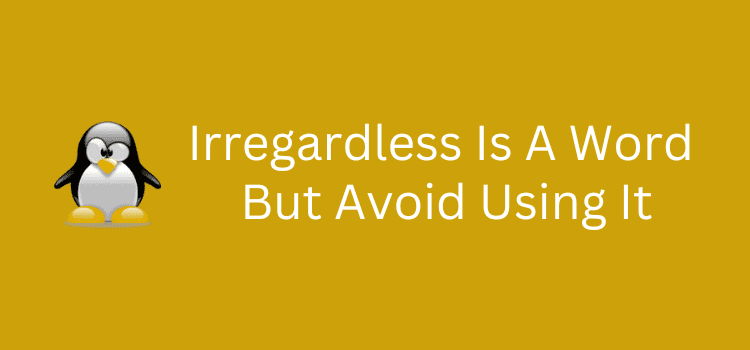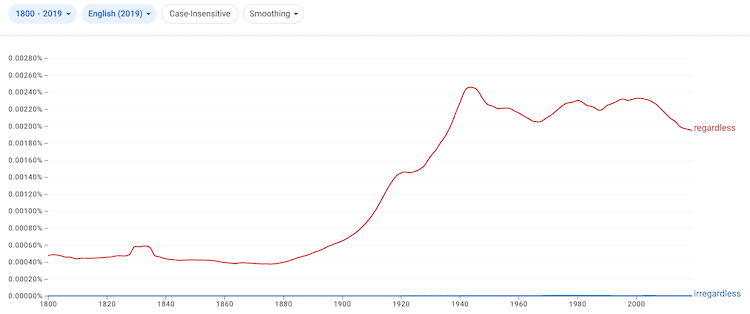
Yes, irregardless is a real word, but it’s the only real word that will make your spellchecker and your boss equally angry.
Most dictionaries list irregardless as a word, but almost all entries label it as a non-standard adverb.
Because English is a reported language, dictionaries include new words once they reach a regular usage level.
Although the word is grammatically incorrect, you hear it often in spoken English. However, it’s a very poor vocabulary choice in writing.
The problem with irregardless
When you hear or read the word, it always means regardless.
The addition of the negative prefix IR is illogical because it creates a double negative with the suffix less, which is also negative.
IR means NOT, and LESS means without.
When you break down the word ir-regard-less, it is saying “not regard without,” or more logically, “not without regard.”
Therefore, the word literally means the opposite of its intended meaning, without regard.
In spoken English, the word rarely creates an issue.
But in good writing, it is not a great word choice.
As you can see from this Ngram graph, it has almost no usage in writing.

Yes, it’s in most dictionaries, but that doesn’t make it a good word to use in writing.
Misused words are common
Many words suffer from misuse or confusion.
While irregardless always means regardless, some people still insist on using it.
Other examples include using less for countable items when fewer is the correct word choice, or confusing infer with imply.
You also sometimes hear or read should of instead of should have.
Another is the confusion between the verb and adverb in phrases like walk passed and walk past.
Most writers want to get things right and perfect their writing.
But there are always choices that you encounter when you are not 100% sure if it’s correct.
It always pays to check in these situations.
Does irregardless appear in print?
Yes, the word is used many times, especially in newspapers.
Here are a few examples.
From The New York Times
“Pennsylvania elected officials passed a whole new law that allows universal mail-in balloting, and did it irregardless of what the Pennsylvania Constitution said.”
— Senator Josh Hawley, Republican of Missouri (Article Link)
Still, the judgments made during en primeur week — or, in the case of 2011, even earlier — have a way of sticking with a vintage throughout its long life, irregardless of how it evolves. (Article Link)
From The Guardian
Irregardless, pedants are individuals who make excessive displays of their own knowledge based on formal rules and overly precise details with an enormity that disregards common sense. (Article Link)
Since Google was going to do this type of work irregardless of the contract, including it simply was being practical. (Article Link)
What is notable about these articles is that it is not the journalists who are choosing to use the word.
In almost all the examples you can find in major newspapers, the use is when quoting a person interviewed for the article.
What’s the origin of the word?
The word has been in use for a long time, so you will find differing opinions.
But perhaps the most credible is that it derived from confusion with the irrespective.
The negative prefix IR is always used before a word starting with R, such as irregular, irresponsible, irrelevant, and irreversible.
So it may have been that it seemed natural to use the prefix before, regardless.
However, the prefix: ir- (not) and the suffix: -less (without) creates a double negative, meaning with regard.
Whatever its origin, this odd word that is with us now, and there is no way of resisting it.
English is always evolving
Unlike some Latin languages, which are controlled, English is reported.
For many years, L’Académie française resisted the use of the word email in French and insisted on courrier électronique as the correct term.
But in English, dictionaries react to usage. Therefore, we now use words like selfie, gaslighting, and permacrisis.
We also turn nouns or even companies into verbs. When we want information, we Google it.
When we call someone, we often say we FaceTime them.
Every year, dictionaries add new words. In March 2023 alone, the Oxford Dictionary added 700 new words.
If we can accept deepfake, antigram, and groomzilla as new words, we can probably accept irregardless.
Perception in writing
You want readers to enjoy, learn or discover from your writing.
But your grammar and vocabulary choices can have a significant impact on how others perceive you and your ideas.
By using the most appropriate or correct language, you can demonstrate your intelligence, competence, and, most importantly, your attention to detail.
Poor choices can detract from the effectiveness of your writing and your credibility.
When we speak, it’s a different matter because there is a far wider range of acceptable vocabulary and grammar.
But in writing, it’s always better to aim for accuracy and correctness.
Summary
Would I use the word? No.
But I don’t make rules for others to follow, regardless of what I might believe.
Every writer makes choices or follows a style guide when there are options or selections to make.
In most forms of writing, clarity is a critical element to ensure your readers understand your writing.
Non-standard language is very often a poor choice because it can be unclear for many readers.
However, that’s not to say that you can’t use it occasionally for a specific purpose or to add emphasis.
Related Reading: Is The Least Worst An Acceptable Phrase In Writing?
Share This Article


